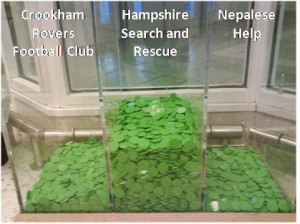If you scored 5 or above points you probably work for what we term a ‘Noble Purpose Organisation’ or NPO. These have many benefits in terms of delivering social gains, often fostering commitment and corporate memory through long lengths of service and providing motivating work. Increasingly the new generation of workers want to make a difference to the world we live in, as in this example from the design sector. NPOs can provide such meaningful work.
That’s not to say that other types of organisations – most notably for-profit businesses – don’t look to engage us in the work we do for them. We all try to find meaning in what we do, whether that effort is for a drinks company or a development agency. However, there is something a bit different about the environment in an NPO, where the admirable work of the institution is generally held as the main reason for coming to work and other motives (power, socialisation, rewards, personal achievement, fun, etc) are absent or hard to declare.
But because of this, working in an NPO can bring its own particular challenges. Only the other day, one of us had a conversation with an upset member of staff in a well-known NPO, one of the most loved charities in the UK. They were distraught by the frustration they feel at work in trying to make a difference. They are dismayed at the obstacles they experience from their colleagues. This is a pattern we have seen many times:
Maybe you have experienced these things too. Why can it be so hard to work in organisations with such fine aims? We call it the NPO Paradox.
What can be done about this? In NPOs, perhaps more than in other places, the role of leaders is crucial to developing healthy workplaces. This may seem counter-intuitive given the plethora of self-motivated people. But it is essential to check the dynamics that can make the working environment so toxic and non-productive.
So, what steps can leaders of these organisations take to foster a culture where staff can work well together to get a great job done?
More generally, if you work for a Government department, third sector organisation, health care body or science community, take the time to:
With this, NPOs can be the very best places to earn a living and make a contribution.
Do you ever:
If you do, then come along to our next Brilliant thinking made easy 2-day programme on 23rd and 24th March 2011. Drawing on the structured thinking ideas used by great speakers, leading strategy firms, high profile research organisations and famous business writers, this course is for anyone in business who needs to build their confidence and capability in helping and influencing others with their questions, insights and ideas.
We’re also taking bookings for our next Facilitating and chairing meetings made easy course on 15th March. You can find details here.
Both these courses can be tailored for in-house for teams of between 8 and 16 people. Email us at courses@idenk.com for more details.
Here are a couple of our recent blogs available from the idenk Blog. You can subscribe for this here. You can now also opt to receive these via Twitter.
When facing changes in our work or personal life it helps to have a ‘Plan B’ as well as a ‘Plan A’. If we can be more imaginative in widening our ideas of what the future might look like, we can increase the repertoire of options available to us.
An example of this is personal scenario planning when facing possible job changes. ‘Plan A’ is often “I hope they keep me on, doing what I do now”.
To move beyond this, it is useful to face our fears. “What is the worst case?” By articulating our anxieties, we can move from just feeling them to confronting them and then to mitigating them. Ask yourself “what am I really afraid of, how would I cope, how could I soften the impact of what might happen?”
Now try to come up with an interesting ‘Plan B’. “What’s an alternative future career or line of work that I could envisage given the goals and resources available to me?” Try to spot the trends you see around you that offer new opportunities. Review the things you’ve done successfully which you can build on. Write down the contacts you know who can help.
It may be a time to start achieving those personal ambitions which you’ve often thought about but never really acted on
Ask us for more on this or a summary of our favourite article on personal resilience.
See these pictures of Stephen Fry.

Same story.
Two papers.
Two photos.
Two impressions?
Waitrose offers tokens which you can allocate to a charity or local organisation as you leave the store. They share £1000 according to the proportion of total tokens each organisation receives.

Which of these three would you allocate your token to?
For what reasons?
When people make quick decisions, it can be worth exploring the underlying reasoning.
PS – this accumulative and transparent way of expressing a preference (where you can see the relative support so far) is quite an efficient and possibly fairer way of allocating resources. It ensures that lower profile needs or those with weaker ‘brands’ or ‘voices’ don’t miss out completely. If you did this blind (ie the boxes were opaque), the most popular one could well get a much higher proportion of the votes as people are less informed and hence less inclined to make some of the alternative choices listed above.
PPS – the Hampshire search and rescue has consistently had the most support.
The idenk team
December 2010
Sign up for updates on our latest thinking via the Business Briefing